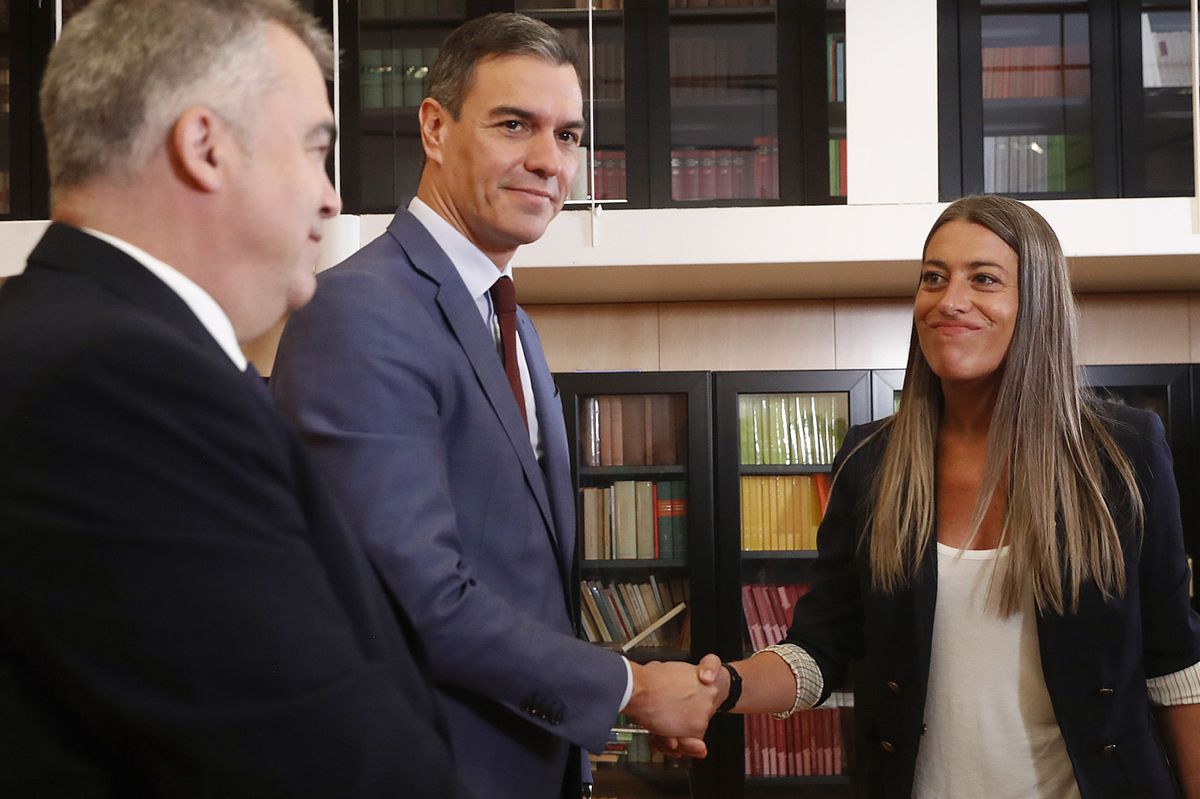 Acting President of the Government Pedro Sánchez meets with the spokesperson of Junts per Catalunya (JxCat) in Congress, Míriam Nogueras, as part of the contact round to achieve his inauguration in Congress last Friday.JPGANDUL (EFE)
Acting President of the Government Pedro Sánchez meets with the spokesperson of Junts per Catalunya (JxCat) in Congress, Míriam Nogueras, as part of the contact round to achieve his inauguration in Congress last Friday.JPGANDUL (EFE)
Days will come when these words will greatly anger many citizens, including socialist activists and voters, but also, albeit to a lesser extent, Sumar’s supporters and voters. Days will come when the ERC and Junts independence leaders will each toughen the tone and content of their demands. Nevertheless, the inexorable deadline for the automatic dissolution of the Cortes if Pedro Sánchez is not installed will force everyone to decide the limits of their principles, their strategies and their expectations. At this point, the texts for the amnesty are almost ready and are being shared with great acceptance. The knot has become tangled in words, not in writings. If Carles Puigdemont continues to express in a text the right of Catalonia to act unilaterally in deciding its future, there will be no agreement.
From the agendas of the PSOE, Sumar, Podemos, ERC and Junts the date of the various consultation modalities that they had promised to their bases on the pacts for the inauguration of Pedro Sánchez was removed. With six weeks remaining until the end-game bell rings and elections are called, the specific texts can continue the polishing process and the verbal demands of the independence movement can still be lowered. According to the government and the socialist negotiators, it is not foreseeable that the maximum demands will weaken in the coming days. Even the President of the Generalitat, Pere Aragonés, has not given up the rhetoric of republican independence, and Carles Puigdemont, leader without needing titles in Junts, has not granted a ceasefire to the PSOE. The interviewees from all affected parties confirmed the current difficulty, without taking into account that something is broken.
In Madrid, the PSOE negotiating commission will officially meet this Tuesday, although its work continues uninterrupted with no calls announced. Conversations with the independence movement are part of his daily life. In Sumar, the information coming from Catalonia and transmitted by Jaume Asens, former deputy of en Comú Podem, is processed fluently. However, this group is not related to CKD.
The Socialists’ channel with Junts per Catalunya is their own, with the particularity that Yolanda Díaz’s relationship of loyalty to Pedro Sánchez and mutual consideration allows us to ignore the concerns that the incumbent second vice president raises among part of the PSOE. Ultimately, the incumbent head of government has information from all parties that is very useful to him. Those sworn in from all parties adhere strictly to it, but also reveal where the problems lie. From a political point of view, the Socialists point to the rivalry between ERC and Junts, embodied by the President of the Republican Party, Oriol Junqueras, and the former President of Catalonia, Carles Puigdemont. They cannot ignore this fact, because for both of them the supremacy of the independence movement in Catalonia is at stake in the elections. Puigdemont also has other elements to consider, namely his personal and criminal future.
The demanding and distant tone expressed by Junts spokeswoman Miriam Nogueras after the meeting with the incumbent government president on Friday and Puigdemont’s demonstrations only show the difficulties, but not that the negotiations have stopped. The same applies to the ERC, although the Speaker of the Parliament, Gabriel Rufián, has rejected Pedro Sánchez’s claim to reach an agreement on the legislation, at least for the first budgets. Now the investiture is only being negotiated with concessions for Catalonia. This also includes amnesty for those persecuted through the trial. Even the drafting of the preamble to the amnesty law is progressing, socialist sources point out, although it may not seem so to constitutionalist ears based on the lofty statements.
After Pedro Sánchez’s first round with the factions, there is no numerical progress – yes, and there is a lot in the texts – except for Bildu. The priorities of this group have not changed: no encouragement of PP and Vox to govern and lasting progress in social and freedom policy. This group, represented at the meeting with Pedro Sánchez by the Speaker of the Congress, Mertxe Aizpurua, and Senator Gorka Elejebarrieta, does not hide its satisfaction with “the photo”. Since 2019, there have been many working meetings with the PSOE, but with this image, their presence in national political life has been “normalized,” they emphasize in this formation. “It is the photo of outrage,” announced the PP. Statements and photos from Borja Sémper, the party’s spokesman, and Javier Maroto, the party’s first vice-president, both Basque leaders at different stages, along with Bildu representatives, were quickly circulated. “The future of Basque society must also be built with Bildu, whether you like it more or less,” emphasized Sémper back in 2014. If Bildu had wanted, there could also have been a photo of his representatives with the king in the group from deliberations to towards investiture This time the Basque independence group rejected the interview with the head of state. He took part in 2011. The then head of state Juan Carlos I shook hands with the representative of Amaiur, Xabier Mikel Errekondo. It was the interview round for Mariano Rajoy’s investiture. Since then they have not repeated a visit or a photo in La Zarzuela.
What influences the most is what happens next. So you don’t miss anything, subscribe.
Subscribe to
Subscribe to continue reading
Read without limits

